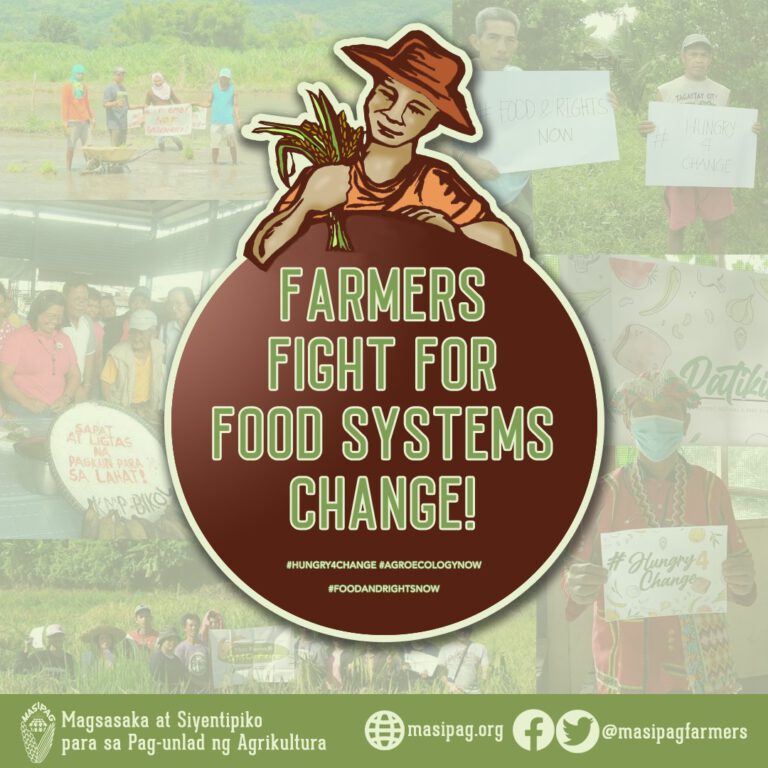
MASIPAG joins hands with the millions of farmers calling for a radical change in the food systems as we commemorate this year’s World Food Day. Rightly dubbed by peasant organizations as “World Foodless Day” to fittingly depict the fragile and unsustainable corporate, profit-driven agriculture, our global food system has been causing misery to the lives and livelihoods of farmers, and, ironically, driving majority of the toiling masses into further hunger and malnutrition, especially now in the time of COVID-19.
UN-FAO chose “Grow, Nourish, Sustain. Together.” as this year’s theme while calling to support our ‘food heroes.’ Yet, the prevailing food system has made farmers, especially in the Philippines poorer and hungrier. Seven months into the lockdown, farmers’ incomes can barely support the needs of their families as they bear the brunt of liberalization of the rice sector causing palay prices to drop to as low as Php 11 a kilo. Add to this the tons of agricultural products that continue to perish due to very low farmgate prices while corporations continue to dominate the local agriculture sector. Biotech industries continue to make a killing from hunger, banking and riding on the Department of Agriculture’s Plant, Plant, Plant program to ensure profit from the sale of privatized seeds and accompanying inputs. Worse, agricultural lands that should supposedly be used to grow the nations’ food needs are being converted into other uses, with vast lands of indigenous peoples planted with crops for export.
The Green Revolution, with its mantra to increase agricultural yields at any cost, has made detrimental effects to farmers, consumers and the environment. Not only did the Green Revolution caused genetic erosion of rice varieties, lead to environmental problems, it has also made farmers no-choice passive recipients of technologies by corporations, leading to disempowerment.
Farmer-saved seeds, which are supposedly free, are seen as competition to privately-owned seeds. The spiraling costs of inputs such as seeds, chemical fertilizers and pesticides has taken away much needed incomes from farmers. With cartels dominating the marketing and distribution of agricultural products, coupled with the influx of imported commodities, forcing farmers to sell their produce at dirt cheap prices. In stark contrast, food insecurity is high in food producing areas, specifically among the farming sector. It is also not surprising that most of the farmers do not encourage their children to go on with farming, leading to a possible food crisis due to the void being created.
The ever-growing power of Big Data is also changing the landscape of food and agriculture, easing out the farmers and local food producers. This has been made worse by the present authoritarian regime, where democratic participation and development work for local food security is being treated as a terrorist act.
These problems did not go unnoticed, even by the United Nations. With the deadline of the 2030 Sustainable Development Goals nearing, the call of civil society for leaders and government bodies to fix the food system has never been louder. In 2021, the World Food Systems Summit will gather experts and leaders to talk about fixing the current food system to make it more responsive to the needs of the people. While this is most welcome, the heavy corporate presence in the process leading to the said summit casts much doubt on the intent and the possible result of the global discussion.
Is this the change that the farmers and the Filipino people want?
The change in the food system can start where the farmers are. The approach taken by MASIPAG for the last 30 years banks on the collective effort of farmers in regaining their control over their resources. With traditional and farmer seeds reaching to more than 2,000 varieties, diversification of food sources, farmer-led marketing and processing, strengthening of people’s organizations and active campaigning for farmers rights has contributed to local food security.
For agriculture to flourish and truly respond to the needs and aspirations of the Filipino people, we need to recognize the role of the small and resource-poor farmers and their great contribution to food security. We must uphold and protect their rights to resources, primarily their right to seeds, land and associated knowledge. To do this, we must do away with the ‘business-as-usual’ agriculture that prioritizes profit by treating food as a commodity over the people’s right to food and farmers rights to resources. Food systems should be guided by farmer-led approaches to food security. The principles of agroecology can be a guide to a sustainable, just and equitable food system, with the aim to contribute to food sovereignty.
On World Foodless Day, there is no other resort but for farmers to change the food system.